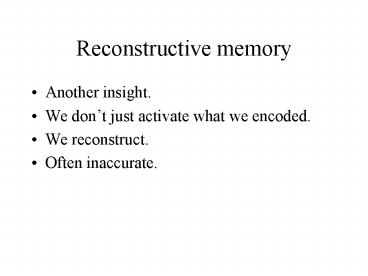Reconstructive memory - PowerPoint PPT Presentation
1 / 23
Title:
Reconstructive memory
Description:
'Did the car stopped at a yield (or stop) sign?' Phase III - Recognition. Stop sign vs Yield sign ... explicit - free recall and recognition. Compared - normal ... – PowerPoint PPT presentation
Number of Views:12
Avg rating:3.0/5.0
Title: Reconstructive memory
1
Reconstructive memory
- Another insight.
- We dont just activate what we encoded.
- We reconstruct.
- Often inaccurate.
2
Eyewitness memory
- Loftus
- Phase I - Car stopping at an intersection.
- Either stop (or yield) sign.
- Phase II - Questions
- Did the car stopped at a yield (or stop) sign?
- Phase III - Recognition
- Stop sign vs Yield sign
- Phase II often influences Phase III
3
False Memory
- Roediger and McDermott (1995)
- Water, stream, lake, Mississippi, boat, tide,
swim, flow, run, barge, creek, fish, bridge,
winding - Stream? Creek? Lake? River?
- Confidence level is high.
4
Why?
- Implicit activation during encoding.
- Reconstructive memory
- Fuzzy trace theory
- Verbatim memory
- Gist memory
5
Flashbulb memory
- Emotional events.
- Remember like taking a photograph.
- Accurate?
- Maybe or maybe not.
6
Implicit memory
- Unconscious retrieval - indirect test
- Big question
- How do you know implicit is different from
explicit? - Answer
- Experimental dissociation
- single dissociation
- double dissociation
7
Single dissociation
- One variable X affects one memory test but not
the other test. - Test A
- X
- Test B
8
Double dissociation
- One variable Xaffects one memory test but the
other variable Y affects the other test. - X Test A
- Y Test B
9
- Double dissociation is more difficult to obtain
than single dissociation. - Most of the evidence - single dissociation.
10
Jacoby (1983)
- Used
- implicit test - Perceptual identification
- explicit test - recognition test
- Manipulated - Study method
- Generate - hot - c_____
- Context - hot - cold
- No context - xxxx - cold
11
- Found
- Explicit test - Generate gt Context gt No context
- Implicit - No context gt Context gt Generate
- Study method influences explicit and implicit
tests differently.
12
Kihlstrom (1980)
- Used
- implicit test - free association
- explicit test - free recall
- Compared - hypnotizability
- Very high
- high
- Medium/low
13
- Procedure
- Under hypnosis, they learned a list of words.
- Then, post hypnotic suggestion - you forget the
words. - After being awaken, they took the test.
14
- Found single dissociation.
15
Warrington and Weiskrantz (1974)
- Used
- implicit - word stem completion word fragment
completion - explicit - free recall and recognition
- Compared - normal vs. amnesic
- normal
- amnesic - Korsakoff Brain damaged
16
- Found
- single dissociation
- Amnesic patients have similar implicit memory as
normal people. - Amnesic condition does not wipe out all memories.
17
Schacter et al. (1991)
- Used pictorial material.
- Implicit - perceptual decision (possible objects)
- Explicit - recognition
- Manipulated - studying method
- perceptual - an object is facing left or right
- conceptual - which category (e.g., furniture)
18
- Found
- Single dissociation
- Encoding method influenced explicit memory but
not implicit memory.
19
So, many concluded that..
- Explicit and implicit memories are different
types of memory.
20
Theories
- What is the difference?
- Tulving
- Explicit - Retrieval from episodic memory
- Used to store personal memories.
- Encoding method matters.
- Implicit - Activation of semantic memory
- Used to comprehend language.
- Encoding method does not matter.
- Elephant is elephant no matter how you encode it.
21
- Roediger
- Implicit - Data driven process
- Activation of perceptual trace.
- The way it was presented matters.
- E.g., modality effect
- Auditory - Visual
- Visual - Visual
- Transfer appropriate processing
22
- Explicit - Conceptually driven process.
- Activation of conceptual trace - proposition.
- It doesnt matter how it was presented.
- No modality effect.
- Anderson
- Explicit - Declarative memory
- You can make it conscious.
- Study method - influences retrievability
23
- Implicit - Procedural
- You cannot make it conscious.
- E.g., swimming

















![[DOWNLOAD]⚡️PDF✔️ Spectacle of Grief: Public Funerals and Memory in the Civil War Era (Civil War PowerPoint PPT Presentation](https://s3.amazonaws.com/images.powershow.com/10056598.th0.jpg?_=20240616074)


![[DOWNLOAD]PDF Spectacle of Grief: Public Funerals and Memory in the Civil War Era (Civil War PowerPoint PPT Presentation](https://s3.amazonaws.com/images.powershow.com/10056113.th0.jpg?_=20240615051)










